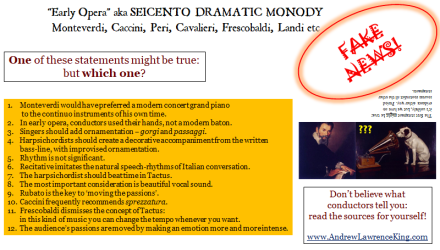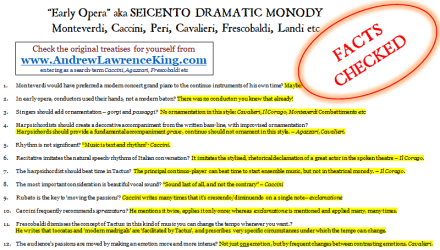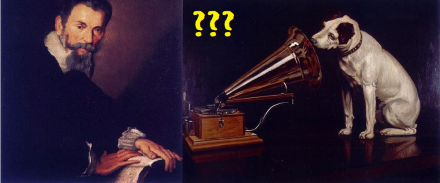Monteverdi would have preferred a modern concert grand piano to the continuo instruments of his own time.
FAKE NEWS??
Don’t believe what conductors tell you, don’t take on trust what your teacher says, don’t accept what I write in this blog:
READ THE SOURCES FOR YOURSELF!
This blog includes many links to original sources, and you can find many more at Early Music Sources .com
Meanwhile, one of the following twelve statements about early opera, i.e. seicento dramatic monody, might be true: but which one?
One of these statements might be true:
- Monteverdi would have preferred a modern concert grand piano to the continuo instruments of his own time.
- In early opera, conductors used their hands, not a modern baton.
- Singers should add ornamentation – gorgi and passaggi.
- Harpsichordists should create a decorative accompaniment from the written bass-line, with improvised ornamentation.
- Rhythm is not significant.
- Recitative imitates the natural speech-rhythms of Italian conversation.
- The harpsichordist should beat time in Tactus.
- The most important consideration is beautiful vocal sound.
- Rubato is the key to ‘moving the passions’.
- Caccini frequently recommends sprezzatura.
- Frescobaldi dismisses the concept of Tactus: in this kind of music you can change the tempo whenever you want.
- The audience’s passions are moved by making an emotion more and more intense.
While you are thinking, here’s a quick advert for a forthcoming publication:
And now, here’s the answer to the quiz:
The first statement might be true: unlikely, but we have no evidence either way.
Period sources contradict all the other statements.
FACTS CHECKED
Monteverdi would have preferred a modern concert grand piano to the continuo instruments of his own time?
Maybe! I consider it unlikely, but we don’t have any evidence either way, so it’s hardly worth arguing about.
In early opera, conductors used their hands, not a modern baton?
There was no conductor: you knew that already!
Singers should add ornamentation – gorgi and passaggi?
No ornamentation in this style: Cavalieri, Il Corago, Monteverdi Combattimento etc
Harpsichordists should create a decorative accompaniment from the written bass-line, with improvised ornamentation?
Harpsichords should provide a fundamental accompaniment grave , continuo should not ornament in this style. – Agazzari, Cavalieri.
Rhythm is not significant?
“Music is text and rhythm”– Caccini.
Recitative imitates the natural speech-rhythms of Italian conversation?
It imitates the stylised, rhetorical declamation of a great actor in the spoken theatre – Il Corago , Peri
The harpsichordist should beat time in Tactus?
The principal continuo-player can beat time to start ensemble music, but not in theatrical monody. – Il Corago.
The most important consideration is beautiful vocal sound?
“Sound last of all, and not the contrary” – Caccini
Rubato is the key to ‘moving the passions’?
Caccini writes many times that it’s crescendo/diminuendo on a single note– exclamatione.
Caccini frequently recommends sprezzatura?
He mentions it twice, applies it only once; whereas exclamatione is mentioned and applied many, many times.
Frescobaldi dismisses the concept of Tactus: in this kind of music you can change the tempo whenever you want?
He writes that toccatas and ‘modern madrigals’ are ‘facilitated by Tactus’, and prescribes very specific circumstances under which the tempo can change.
The audience’s passions are moved by making an emotion more and more intense?
Not just one emotion, but by frequent changes between contrasting emotions. Cavalieri.
See also these links:
How to study Monteverdi’s operatic roles
How did it feel? A history of heaven, hearts & harps
The wedding dance: Monteverdi’s Lasciate i monti
How to Act: preliminary exercises for Baroque Gesture
and many other articles in this blog.






Pingback: It’s Recitative, but not as we know it | Andrew Lawrence-King
I always enjoy seeing modern-day myths about old music corrected through a clear reading of the original sources. I know that I have seen the unsupported statements you debunk published in recent memory, but can you please cite the author and source of those statements? Thanks.
RA
Dear Ron, Thanks for your comment! I made up the statements myself, quite carefully, to reflect what I’ve heard directors/teachers/colleagues say, and what we see on the concert platform in many modern-day performances, as well as to sound attractively plausible… but wrong!
I wouldn’t like to point the finger of blame at any particular colleague, so I think it’s best just to leave it there, that I constructed the statements, for the purposes of this post!
Dear Andrew, many thanks for this which is not only entertaining but highly instructive.
Here in Australia we have some very eminent continuo players/directors who take the approach “more is more” whatever ancient authority they choose to rely on, and so Monteverdi, Cavalli performances right up to Handel are often filled with gorgeous washes of sound as often as possible. While as a continuo player myself I appreciate the glamorous technique, I do wonder sometimes whether the effect is merely to mask the singing.
I do enjoy your blog and please be assured after your recent difficulties that your reputation remains unparalleled.
Best wishes, Peter Young (Canberra)
Thanks for your appreciation! Yes, there is a tendency to use large continuo-sections, even when they are not historically appropriate. All good fun, of course, but perhaps the habit shows an underlying misunderstanding of how the music works in those other repertoires. If we think the “wrong” instrumentation sounds “better”, there’s probably something we haven’t understood yet… otherwise, it’s perilously close to the argument “Bach would have preferred modern piano, had it been available”…
PS Brian Robins has written passionately about the misuse of large continuo sections in Handel….